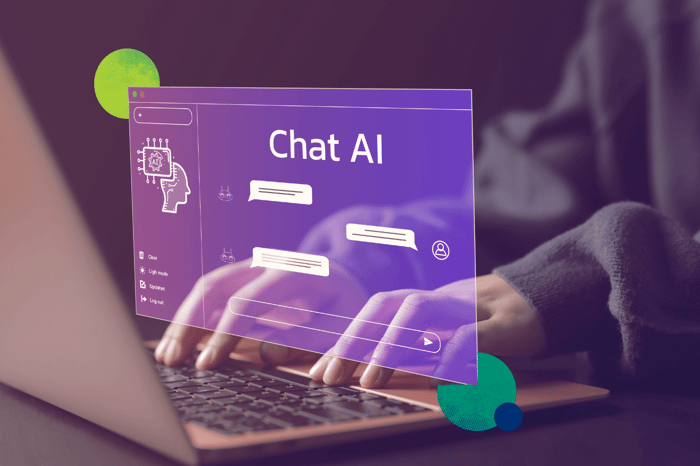TL;DR: AI can be an incredible tool for research, writing, and time management, but it’s important to understand how to ethically use AI as a student. This guide walks you through tips and tools for how to use AI ethically as a student to help you generate ideas, work smarter instead of harder, and turn the quality of your work up a notch so you can ace your assignments.
Chances are you’ll find artificial intelligence (AI) tools useful when working through your StraighterLine courses to earn college credit more affordably.
We’re living in an exciting time where artificial intelligence can help us with everything from research to writing papers. This begs the question: how can you get the most out of these AI tools while using them responsibly? This guide breaks down best practices for ethical AI use, as well as practical applications and real-life examples for responsible AI use.
Table of Contents
- Best Practices for Ethical AI Use
- Evaluating AI-Generated Content for Accuracy and Bias
- Academic Integrity in the Age of Artificial Intelligence
- Must-Have AI Tools for Students
- Stay on Top of Artificial Intelligence Standards and Guidelines
- Artificial Intelligence’s Shortcomings: What to Know and How to Respond
- A Real World Example of How to Use AI Ethically As a Student
- Earn College Credit with StraighterLine
- Frequently Asked Questions About How to Use AI Ethically As a Student
Best Practices for Ethical AI Use
Navigating AI in education is all about balance and sticking to these best practices for AI usage can help you make the most of the tools that are available to you while staying true to your academic integrity. Here are some straightforward tips to keep in mind:
Use Artificial Intelligence As a Helper, Not a Replacement: Think of AI as a reliable assistant. It can boost your output, but should never compromise your own insights and creativity.
Fact-Check: Just because an AI spits out information, doesn’t mean it’s always spot on. Always verify and ensure you’re using credible sources.
Give Credit: If you borrow ideas or content from AI, be upfront about it. Transparency is key, and acknowledging sources helps maintain respect for everyone’s work.
Stay Updated: AI is changing fast. Keep yourself in the loop about new developments and ethical considerations to ensure you’re using these tools responsibly.
Talk It Out: Share your thoughts and experiences about using AI with classmates and teachers. Open discussions can deepen your understanding of how to navigate these new challenges together.
Evaluating AI-Generated Content for Accuracy and Bias
Whether you’re writing a paper or analyzing data, being mindful of using AI ethically ensures you’re not crossing any lines. Now that AI in education is the norm, the goal is to use it to enhance your learning — not to have it do all of your work for you.
As you become more familiar with how to use AI ethically as a student, there are a few ethical pitfalls to watch out for. One of the most common is AI bias — it’s real and it can be sneaky. AI models are trained on massive data sets, which means they can sometimes reinforce old biases or skew information. This is especially true for AI in social sciences and AI in humanities, where fairness and context are crucial. Your ability to think critically is your strongest asset when it comes to effectively evaluating AI-generated content for accuracy and bias:
Look for inconsistencies and unsupported claims, as they may indicate underlying biases.
Consider the language used in the output — biased content may use loaded or inflammatory language.
Incorporate tools that specialize in evaluating AI-generated content (such as QuillBot) — especially those that assess AI accuracy in research by analyzing the data sources and methodologies used in the artificial intelligence’s training.
By applying these practices, you’ll level up your ability to discern reliable information and engage with AI ethically.
Academic Integrity in the Age of Artificial Intelligence
As artificial intelligence tools become an everyday part of education and the learning experience, academic integrity in AI has never been more important. AI can be super helpful for things like organizing ideas or streamlining tasks, but the importance of integrity in education still stands when it comes to your own work. It’s not just about playing by the rules — it’s about actually learning and growing. AI can assist, but being honest and doing the work yourself is what really counts, and is how you’ll learn the skills and concepts needed to be successful outside of the classroom.
Must-Have AI Tools for Students
There’s a whole world of AI tools out there waiting to be explored, but here’s a great starting point of some of the apps that will help out on your journey:
ChatGPT: AI chatbot that can help with a variety of tasks, including answering questions, translating languages, summarizing texts, and writing.
Scholarcy: a tool that creates easy-to-digest summaries of documents, articles, and reports to help you understand the content more quickly.
Grammarly: a writing assistant that combs through your writing to check for grammar, spelling, and word choice errors.
Gemini: a Google workspace tool that helps with writing and refining blogs, emails, and any other writing project you can think of.
Kickresume: an artificial intelligence-powered platform that helps you write your resume and cover letter in seconds, build your professional website, and map your career.
DeepAI: a collection of tools that can help with a variety of tasks, including image generation and editing, video creation, writing, and enhanced web searching.
Quizlet: uses AI to generate personalized study materials including flashcards, practice tests, and quizzes.
StudentAI: AI tools that address all aspects of the student experience, including note taking, mock interviews, budgeting, exam prep, and more.
As you’re exploring all of the different AI tools, you’ll find that they’re designed to support diverse learning styles. For example, visual learners can benefit from DeepAI’s visual-first approach, while auditory learners might find value in apps that offer spoken summaries and explanations, such as ChatGPT. Kinesthetic learners can use Quizlet’s interactive platform to engage in study materials through games and hands-on activities. Any of these AI tools can create a personalized learning experience that suits your preference, enhances your academic journey, and makes study sessions more effective and enjoyable.
With AI continuing to progress, new ethical safeguards are being built into these tools to prevent biases and protect user data. This is particularly important in fields like healthcare where ethical AI use can have real-world impacts.
In the near future, expect AI tools to become even more tailored to your individual learning style. We’re looking at a world where AI helps you learn smarter, not harder. But with these advancements come even more responsibility to use AI ethically as a student and stay informed on the latest guidelines.
Stay on Top of Artificial Intelligence Standards and Guidelines
AI isn’t a free-for-all; it’s actually governed by various frameworks, especially when it comes to AI in education, economics, business, and beyond. Keeping up with AI regulation is important if you want to make sure your AI use is legit. Plus, following ethical standards will help you navigate artificial intelligence’s role in both academic and professional settings.
Even if AI is assisting you, it’s your name on that paper. Academic integrity means you still need to own the work and make sure everything is your original thought — AI or no AI. When using AI in areas like natural sciences and veterinary sciences, cutting corners could lead to issues down the line without proper review, so always keep that integrity in check.
There are legal issues to consider, too. Some AI tools collect data from third parties, and not all of it is fair game. No matter what you’re using AI for, make sure the tools you’re using are legit and don’t violate copyright or privacy rules. It’s all part of how to use AI ethically as a student.
Artificial Intelligence’s Shortcomings: What to Know and How to Respond
Sometimes, using AI responsibly isn’t as clear-cut as you’d think. You might run into ethical issues around AI’s limitations. For example, it doesn’t account for nuance in social learning. When in doubt, stick to the basics: don’t over-rely on AI. Check its work and always add your own touch.
As has been discussed throughout this guide, AI tools aren’t perfect. They can glitch or give outdated information. When using AI in engineering or AI in economics, even a small error can compromise your work. So always cross-check AI-generated content with trusted sources to make sure you’re not getting bad info.
A Real World Example of How to Use AI Ethically As a Student
A great example of how to use AI ethically as a student comes from Yeshiva University students who used AI in environmental sciences to analyze climate change data and model climate forecasts based on the trends they uncovered. They used AI to speed up their research, but made sure to manually verify the AI’s conclusions to avoid errors or biases.
Beyond that, industries like healthcare and law are paving the way for ethical AI use. They’re finding ways to tap into AI’s power while sticking to strict ethical standards, which can serve as a blueprint for students looking to use AI responsibly.
So what’s the main takeaway? Ethical use of artificial intelligence in your school work is all about balance, transparency, and good judgment. If there’s an opportunity to produce higher quality work using AI, you should definitely explore it. Just remember: it’s your work, your integrity, and your responsibility to keep things ethical. You’re the one being graded — not the AI. Stay transparent, ask questions, and let artificial intelligence be the sidekick that makes you a smarter, better student — without doing all the work for you.
Earn College Credit with StraighterLine
You’re welcome to use AI ethically as a StraighterLine student. You’ll save time and money by knocking out your prereq and intro classes online with us, and the credits you earn are guaranteed to transfer to your school and count towards your degree.
Browse our courses page to find your classes and start earning college credit online.
Frequently Asked Questions About How to Use AI Ethically As a Student
What are key ethical considerations when using AI in education?
It’s all about keeping things fair, avoiding bias, protecting your data, and staying true to academic honesty while using AI.
What are the recommended guidelines for AI use in education?
Recommended guidelines for AI in education are to use AI to help, not do all the work for you. Be open about when you’re using it and double-check the info it provides you to make sure it’s legit.
How can you, as a student, integrate AI tools responsibly into your studies?
You can integrate AI tools into your studies by letting AI boost your learning, but always fact-check the information it gives you. Don't lean on it too hard for assignments — think of it as a study buddy, not a shortcut.
What are common misconceptions about AI ethics for student use?
Some people think AI can replace thinking, but it’s just a tool. It’s not always perfect, so don’t expect it to do everything for you.
How does AI impact your responsibility as a student in academic settings?
The key to how to use AI ethically as a student is to remember that you’re still responsible for your own work. Be smart about how you use AI — don’t cross the line into plagiarism or let it take over your studies.












